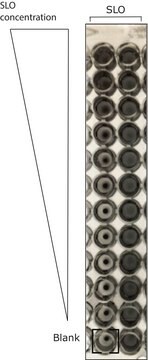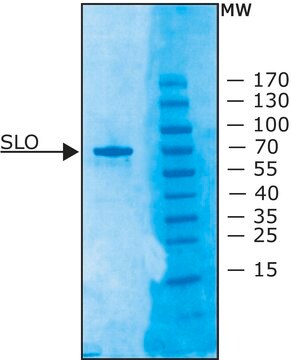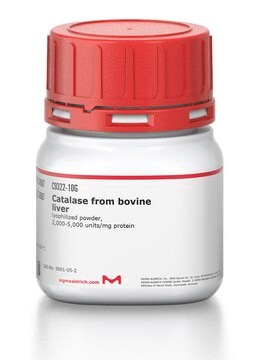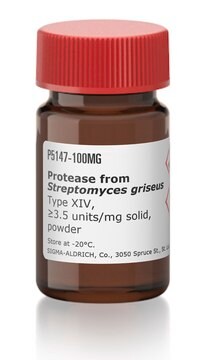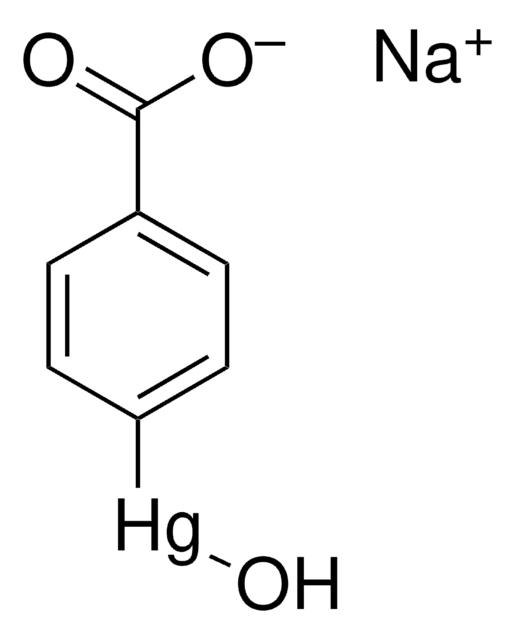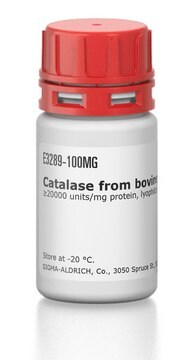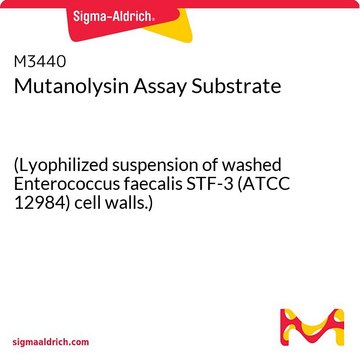About This Item
Produtos recomendados
fonte biológica
Clostridium tetani E88
peso molecular
55 kDa
aplicação(ões)
cell analysis
temperatura de armazenamento
2-8°C
Informações sobre genes
Clostridium tetani E88 ... CTC01888(1060232)
Descrição geral
Hemolytic activity of tetanolysin is determined using 2.5% rabbit red blood cells at 37 °C for 40 min.
Aplicação
Tetanolysin has been used to analyze the formation of lytic pores in red blood cells (RBCs)1. It has also been used to permeabilize infected RBCs2.
Ações bioquímicas/fisiológicas
Cholesterol-binding toxin used to permeabilize cellular membranes to enhance the entry of macromolecules into the interior of the cell. Pores induced reported to be in the range of 20-50 nm.
Cholesterol-binding toxin used to permeabilize cellular membranes to enhance the entry of macromolecules into the interior of the cell..
Nota de preparo
Prepared by a modification of the method of Haque, et al.
Reconstituição
When reconstituted with 100 μl of sterile water the concentration is 1 μg/μl in 40 mM sodium phosphate buffer, pH 7.2, containing 200 mM NaCl.
Nota de análise
Single band by SDS-PAGE.
Código de classe de armazenamento
11 - Combustible Solids
Classe de risco de água (WGK)
WGK 3
Ponto de fulgor (°F)
Not applicable
Ponto de fulgor (°C)
Not applicable
Equipamento de proteção individual
Eyeshields, Gloves, type N95 (US)
Escolha uma das versões mais recentes:
Já possui este produto?
Encontre a documentação dos produtos que você adquiriu recentemente na biblioteca de documentos.
Hayley E Bullen et al.
The Journal of biological chemistry, 287(11), 7871-7884 (2012-01-19)
To survive within its host erythrocyte, Plasmodium falciparum must export hundreds of proteins across both its parasite plasma membrane and surrounding parasitophorous vacuole membrane, most of which are likely to use a protein complex known as PTEX (Plasmodium translocon of
Jason W Rosch et al.
The Journal of clinical investigation, 120(2), 627-635 (2010-01-23)
Sickle cell disease (SCD) is characterized by intravascular hemolysis and inflammation coupled to a 400-fold greater incidence of invasive pneumococcal infection resulting in fulminant, lethal pneumococcal sepsis. Mechanistically, invasive infection is facilitated by a proinflammatory state that enhances receptor-mediated endocytosis
Nossa equipe de cientistas tem experiência em todas as áreas de pesquisa, incluindo Life Sciences, ciência de materiais, síntese química, cromatografia, química analítica e muitas outras.
Entre em contato com a assistência técnica